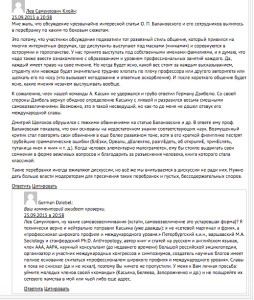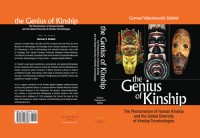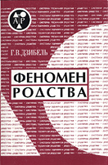Kunstkamera: Western Sanctions Imposed on Prominent Russian Academics
Political and epistemological battles between a group of Russian official, or academic scientists and a group of Russian entrepreneurial, or folk scholars continue. Since the publication of a “resolution” denouncing Anatole Klyosov’s DNA Genealogy as pseudoscience (extensively covered on this blog here and here) the conflict has not abated (as academic scientists probably hoped) but exacerbated. A couple of recent highlights.
1.Elena A. Mironova (Елена Миронова, an academically-trained philologist and professor of Rostov State School of Economics who joined the ranks of folk scholars, entered one Trinitarian Academy, co-authored a number of papers with Klyosov and was therefore punished by the academic world with a profile in Freakipedia) filed a complaint with Rector of the Russian State School of Humanities (RSSH), Efim Pivovar (Ефим Пивовар), cc-ing Minister of Science and Education Dmitry Livanov (Дмитрий Ливанов). In it, she accused а RSSH professor, Dmitry Beliaev (Дмитрий Беляев), an unrivaled young Russian specialist in Mayan hieroglyphics, of the embezzlement of grant funds. According to Mironova, Beliaev spent grant money on rehashing Western literature on the subject (which is understandable considering that Beliaev was born in Tula, is based in Moscow but his scholarly dreams have transported him to Central America) without contributing anything new to the problem. Beliaev responded to the accusation on his weblog “Maoist” with a bold, sarcastic post that drew two comment pages worth of cheering, chuckling and giggling from a horde of mostly anonymous fans of Russian academics as well as from Beliaev’s buddies and good reposters such as Hittologist, xenophobe and freak-hunter, Alexei Kassian (Алексей Касьян). It remains unclear if there is indeed anything new and substantive in Beliaev’s writings on Mayan hieroglyphics and whether the allocation of grant funds to Mironova’s project on seeking scientific explanations for ancient look-alike ceramics across the world would have been a smarter decision. On the one hand, if Beliaev serves as a mouthpiece for Western Mayanists in Russia by day (and a vocal watchdog for pseudoscientists by night), Western Mayanists, but not Russian funding agencies, should foot Beliaev’s bills. On the other hand, not every remarkable ceramic phenomenon observed all over the world should be given a state-sponsored scientific explanation. So, the contested cash should probably have stayed with the funding agency.
2. A technically international (but largely Russian or post-Soviet) team of geneticists published in PLOS One a seminal English-language paper providing a synthesis of autosomal, mtDNA and Y-DNA information on Balto-Slavic origins (“Genetic Heritage of the Balto-Slavic Speaking Populations: A Synthesis of Autosomal, Mitochondrial and Y-Chromosomal Data”). In the Russian media, principal investigator, Oleg Balanovsky, praised his own effort as the last major contribution to the problem for years to come. Anatole Klyosov jabbed with a bold and sarcastic critique entitled “How a Mountain Birthed a Molehill: A Broadcast Paper on the Balto-Slavs.” Balanovsky responded with a mostly poised and accurate rebuttal. But then a scuffle began. Although not listed in the title, the actual paper contained a hidden lexicostatistical account of Balto-Slavic linguistic divergence. So, in reality, the paper offered not just an autosomal, mtDNA and Y-DNA synthesis but also a linguistic one. And it’s only because this larger-than-life synthesis would have sounded confusing and presumptuous, the authors decided to white-label the lexicostatistical piece. But the consumer of scientific writing ended up getting a synthesis of 4 for the price of 3, which is always a good thing. This lexicostatistical gem was authored by Anna Dybo (an Altaist) and Alexei Kassian (a Hittologist), the two poster children of one interstellar “Moscow school of linguistics.” (An academic counterpart to the Trinitarian Academy of the folk scholars, the “Moscow school of linguistics” is engaged in comparing all the look-alike words from the world over under the program called “The Tower of Babel.”) Klyosov happens to like lexicostatistics as a scientific method because it allows one to quickly date historical events without working with the actual linguistic material. So do Dybo and Kassian. (There are times when academic and folk scholars are in agreement.) But Klyosov favors an older, pre-1990s version of lexicostatistics because the resulting dates of Balto-Slavic divergence fit better with the dates obtained from his DNA Genealogy. An avowed freak-hunter Kassian dashed at Klyosov with a verbal pitchfork for what ostensibly looked like Klyosov’s misreading of Sergei Starostin’s 1989 paper. In his xenophobic rage, Kassian himself misread (or consciously misconstrued) the said paper and hoped that nobody would check his words against the original because nobody outside of the narrow circle of the “Moscow school of linguistics” understands linguistics. The discussion was taking place at a population genetics website генофонд.рф, so Kassian’s plan made sense. If geneticists included him as a co-author once, without checking his linguistics, then they would do it again! But it did not work just that one day, as I happened to be passing by. I retrieved Starostin’s paper and corrected Kassian. Kassian was recently awarded, behind closed doors, by his long-term friends and colleagues a Habilitation Doctorate (which made him twice as accomplished in philology as the Klitschko brothers are in sports), so being publicly peer-reviewed by Dziebel (here, too) made him furious. He lost his cool and responded with insults (calling me “freak” and “fringe internet personality”), while offering no actual rebuttal (thus silently acknowledging that my correction was right on the money). I parodied Kassian’s insults and, for a comical effect, called him “Doctor of Cuneiform Sciences” and “Academic Troll” and to get the record straight introduced myself to the audience as a “broadly and internationally trained professional.” Upon hearing the screaming, Oleg Balanovsky’s mother (who was incidentally also listed among the 40+ authors of the PLOS One paper) came running from the kitchen and quickly apologized for the “freak” word (but not for the “fringe internet personality” label). Kassian, under pressure from his team members, erased just that one insult from his response to me. Valery Zaporozhchenko, a very young, passionate but uncredentialized freak-hunter who reports into Oleg Balanovsky and is always summoned when there’s a need to tackle folk scholars from the point of view of any kind of statistics (an academic counterpart of folk scholars’ numerology), blocked my response to Kassian’s insults and attacked me for self-aggrandizement. Zaporozhchenko said that no one at their website has ever referred to himself as “broadly and internationally trained professional.” I knew very well why that was indeed the case (because, pardon my French, there aren’t any at that web property) but decided to stay out of trouble. But I miscalculated. Oleg Balanovsky’s mother realized that they somehow allowed “broadly and internationally trained professionals” into their house party and said that she regretted that they had allowed me to comment on their local luminary, Kassian, in the first place. She proceeded to openly lie to the audience claiming that she had to “edit” my post for even worse insults directed against Kassian. In reality, she edited nothing because there was nothing to edit. Elena obviously hoped – naively so considering that it’s impossible to hide anything in this day and age – that nobody would be able to check the veracity of her claim and that she would carry her dirty little secret into the grave. Then a moderator, Nadezhda Markina (Надежда Маркина), issued a warning to me for the “violation of ethical norms on the site.” I tried to post a comment explaining that I violated nothing, that Kassian was in fact a violator and that I request continuing harassment, xenophobia and hate toward me coming out of Kassian, Zaporozhchenko, Beliaev and генофонд.рф to immediately stop. My comment was blocked and I received an e-mail saying that I was banned from commenting on генофонд.рф for a month. My blocked comment was replaced by that of archaeologist Leo Klein (Лев Самуилович Клейн) (born in 1927), the godfather of this team of Russian academics, who used some antiquated Russian words to chide me for self-aggrandizement, Kassian for rudeness and me, again, for rudeness that exceeded Kassian’s rudeness, regretted the escalation of ad hominem attacks that cloud the discussion of a “very interesting paper” but acknowledged that he may not be completely “cued-in.”
For illustration purposes, here’s a screengrab of my last blocked comment that came on the heels of Klein’s comment.
I hereby announce the onset of Western sanctions intended to curb corruption, cyberbullying, hate, double standards, bickering and ad hominem attacks routinely employed by Russian folk and academic scientists. In line with these sanctions, website генофонд.рф is now blacklisted as a web property that encourages hate, cyberbullying and pseudoscience and that suppresses freedom of speech. Oleg Balanovsky’s mother is sanctioned for public lying and selective apologizing. Alexei Kassian and Valery Zaporozhchenko are sanctioned for persistent hate, double standards, bickering, disrespect, self-aggrandizement, ad hominem attacks, ignorance, xenophobia and pseudoscientific statements. Leo Klein is issued a gentle warning for misplaced, biased and hifalutin rhetoric. The sanctions are in place for a month.


